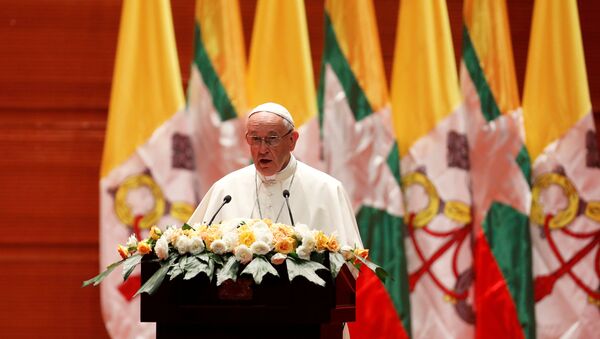On his way back to Rome after a trip to Asia, the Christian leader told journalists that a conventional meeting with Rohingya refugees in Bangladesh, initially set as one of the requirements of his first four days tour to the country, has made him cry.
"I wept, I tried to do it in a way that it couldn't be seen… They wept too… I told myself 'I cannot leave without saying a word to them'," Pope Francis said.
The pontiff has shared a forgiving spirit with the refugees, addressing them.
"In the name of all those who have persecuted you, who have harmed you, in the face of the world's indifference, I ask for your forgiveness."
Dear friends in Myanmar and Bangladesh, thank you for your welcome! Upon you I invoke divine blessings of harmony and peace.
— Pope Francis (@Pontifex) 2 декабря 2017 г.
I want my visit to embrace all the people of Myanmar and to encourage the building of an inclusive society.
— Pope Francis (@Pontifex) 28 ноября 2017 г.
He also hailed Bangladesh's efforts to help the Muslim minority fleeing violence in Myanmar.
"What Bangladesh has done for them is enormous, it's an example of welcome," he said.
In plane presser from Bangladesh to Rome, talking his meeting with Rohingya refugees, Pope says, “I tried to hide my crying” — working English transcript via @Tornielli: https://t.co/gM48CrA32j pic.twitter.com/lunf4BXWe6
— Rich Raho (@RichRaho) 2 декабря 2017 г.
Pope's Visit to Myanmar and Bangladesh Amid Rohingya Crisis
The pontiff had decided to travel to Bangladesh on the advice of the Archbishop of Yangon, who had anticipated that the situation around the Rohingyas might aggravate tensions and endanger Christians in the area.
As I prepare to visit Myanmar and Bangladesh, I wish to send a message of greeting and friendship to everyone. I can't wait to meet you!
— Pope Francis (@Pontifex) 25 ноября 2017 г.
"I knew that I was going to meet the Rohingyas but I did not know where and how, for me it was one of the conditions of the trip," he said.
However, the Christian leader has explained that he had been avoiding any direct reference to the minority in public while communicating with Buddhist leaders to overcome "prejudice and hatred", trying not to touch upon the sensitive issue, as Myanmar Buddhists do not consider Rohingyas a distinct ethnic group.
READ MORE: Pope's Emphasis on Religious Harmony a Strong Message to Myanmar
"If I had used the word during an official speech I would have slammed the door," he said, adding: "They already knew what I thought."
Pope Francis has summarized his experience during the tour by saying that for him the most important thing was "that the message gets through".
May the wisdom of God help us to know how to welcome and accept those who think and act differently from us.
— Pope Francis (@Pontifex) 2 декабря 2017 г.
The Rohingya crisis, which saw its origins in a conflict between the Muslim minority and the country's Buddhist majority, intensified on August 25, 2017, when Muslim insurgents of Rohingya origin attacked security posts in Myanmar's Rakhine state.
READ MORE: Myanmar's Civilian Leader Responds to Pope's Appeal to Ensure Justice
The Myanmar military's subsequent brutal crackdown led to a number of clashes and the death of hundreds of Rohingya people. According to the International Organization for Migration, the violence has driven more than 610,000 Rohingya refugees across the border to Bangladesh.



